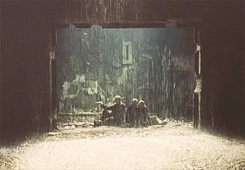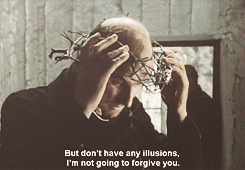Writer: All my life, I have never seen one happy person.
Stalker: Nor have I. They return from the Room and I guide them back. And we never meet again. Wishes don't come true immediately, you know.
Stalker (1979)

The three main characters of "Stalker", sitting in a corridor which is being flooded by rain
In Andrei Tarkovsky’s landmark 1979 film, Stalker, there is a room in the mysterious and dangerous Zone which, if you enter it, will give you the one thing you most desire. Even though travelling into the Zone is forbidden, not to mention extremely hazardous, people risk their lives to get to that room...only to find that what they are given is not what they thought they wanted. This sudden insight into their own true desires is devastating. You can’t really know yourself, not with any finality, the film seems to be telling us, and if you could it would destroy you. And yet, inside that room – that part of ourselves - are the possibilities for the desire to know.
In Stalker, Tarkovsky uses a science fiction setting to explore the nature of the unconscious - how well can we know ourselves? How does this unknowability affect our sense of who we are, how we create our subjectivity in relation to others? How, in short, can you be a person if your own desires are opaque to you?

The titular character of "Stalker", placing a crown of thorns on his head and saying "But don't have any illusions, I'm not going to forgive you."
At BKI, we believe that, while we can never fully understand or know the unconscious, we can find clues in the world around us - in our interactions with others, ourselves, and our culture - on what might be going on under and through the surface, in that mysterious room that we can never fully enter or never truly leave. And over the next few weeks, we want to take you on a psychoanalytic tour of pop culture, unpacking our obsessions and exploring what they say about us, our culture, and the times we live in. We can’t promise that we’ll suddenly understand what happens in those unconscious, unknowable places inside ourselves – but we can learn why, perhaps, we are so fascinated with superheros, or with food television, or those horrible people who travel Australia in vans and post Youtube videos about it, and maybe a little bit about ourselves along the way. Follow the series on this blog, and join the conversation on Twitter and on Facebook.
Next up: Medical drama, group relations, and catharsis - why do we like Grey’s Anatomy so much, anyway?
© Bureau Kensington, Inc, 2022 | 252 Augusta Ave, Toronto, ON, M4L 3B3
Bureau Kensington's carbon emissions are offset by